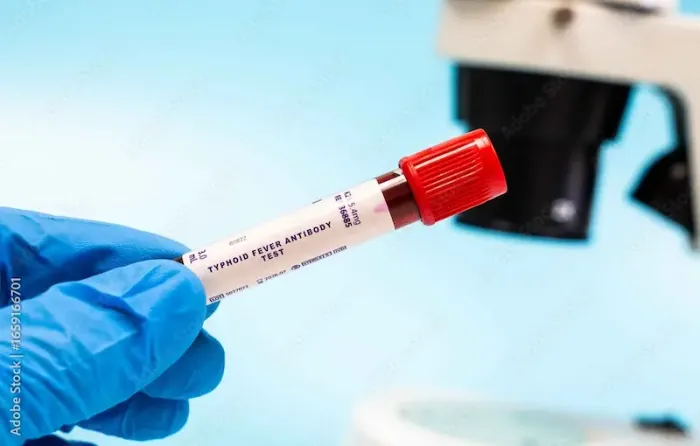Understanding Typhoid Fever Symptoms, Causes, and Prevention
Learn about typhoid fever, including its symptoms, causes, transmission, risk factors, diagnosis, treatment, and prevention through vaccines and hygiene practices. Stay informed to protect yourself and your family.

Written by Dr. Siri Nallapu
Reviewed by Dr. Shaik Abdul Kalam MD (Physician)
Last updated on 13th Jan, 2026

Typhoid fever is a serious bacterial infection that, despite being rare in industrialised nations, remains a significant health threat in many parts of the developing world. Caused by the bacterium Salmonella Typhi, this life-threatening illness spreads through contaminated food and water. For travellers and those living in endemic areas, understanding typhoid fever is the first critical step toward prevention and seeking timely treatment. This guide will walk you through everything you need to know, from the first signs of infection to long-term prevention strategies, empowering you with the knowledge to protect yourself and your family.
What Exactly Is Typhoid Fever?
Typhoid fever is a systemic illness caused by the highly human-specific bacterium Salmonella enterica serotype Typhi. Unlike other Salmonella strains that cause food poisoning, S. Typhi doesn't just affect the gut; it invades the bloodstream, lymphatic system, and other organs, leading to a prolonged and debilitating fever. The disease has a storied and grim history, often spreading through crowded, unsanitary conditions. Famous historical figures like "Typhoid Mary" Mallon, an asymptomatic carrier who infected dozens in early 20th-century New York, highlight the stealthy nature of this infection. Even today, the World Health Organisation (WHO) estimates 11-20 million cases and 128,000 to 161,000 typhoid-related deaths occur annually worldwide, primarily in South Asia and sub-Saharan Africa.
Causes and Transmission: How Do You Get Typhoid?
You cannot get typhoid fever from animals or through the air. The causes of typhoid fever are solely linked to human-to-human transmission of the S. Typhi bacterium.
The Faecal-Oral Route of Transmission
The primary mode of transmission for typhoid is the faecal-oral route. This means a person ingests microscopic particles from an infected individual. This sounds alarming but happens more easily than one might think, primarily through:
• Contaminated Water: Drinking water tainted with sewage is the most common source of outbreaks.
• Contaminated Food: Eating food handled by someone who is shedding the bacteria and who hasn't washed their hands thoroughly after using the bathroom. Shellfish from sewage-polluted water and raw fruits and vegetables rinsed with contaminated water are also common culprits.
• Direct Contact: In rare cases, direct contact with an infected person can spread the bacteria.
The Role of Asymptomatic Carriers
A unique and challenging aspect of typhoid transmission is the asymptomatic carrier. Some people, even after recovering from the illness, continue to harbour the bacteria in their gallbladder or intestinal tract. They can shed the bacteria in their stool for years, unknowingly becoming a source of new infections, much like Typhoid Mary. This makes public sanitation and hygiene practices critically important.
Recognizing the Symptoms: Early and Late Stages
The symptoms of typhoid fever often develop gradually, typically 1-3 weeks after exposure to the bacteria. The illness progresses through several stages, and recognising the early signs of typhoid can be crucial for a better outcome.
Early-Stage Symptoms (First Week)
The initial presentation is often similar to many other febrile illnesses, which can lead to misdiagnosis.
• Fever: That starts low and increases daily, often reaching 103–104°F (39–40°C).
• General Malaise: Weakness, fatigue, and body aches.
• Headache: A persistent and troubling headache is very common.
• Dry Cough: A non-productive cough is frequently reported.
• Abdominal Pain: Discomfort and pain are common early signs.
Progressive Symptoms (Second Week)
If left untreated, the disease advances, and symptoms worsen.
• Sustained High Fever: The fever continues and may plateau.
• "Rose Spots": A classic but not-always-present sign: small, pink, blanching spots on the trunk and chest.
• Gastrointestinal Distress: This includes either diarrhoea (more common in children) or severe constipation (more common in adults).
• Extreme Fatigue and Weakness: The patient may become too weak to get out of bed.
• Mental State Changes: Delirium, confusion, and agitation can occur, giving typhoid its old name, "nervous fever."
Severe Complications (Third Week and Beyond)
Without treatment, the patient enters a critical stage with a high risk of life-threatening complications of typhoid.
• Intestinal Perforation: The bacteria cause ulcers in the small intestine that can tear, spilling intestinal contents into the abdominal cavity and causing peritonitis—a medical emergency.
• Intestinal Haemorrhaging: Severe bleeding from the intestinal ulcers.
• Encephalitis: Inflammation of the brain.
• Sepsis: The bacteria spreading through the bloodstream can lead to a catastrophic full-body inflammatory response.
Who Is Most at Risk? Key Risk Factors
While anyone can contract typhoid fever, certain groups face a significantly higher risk:
• Travellers to Endemic Areas: Individuals visiting parts of the world where typhoid is common, particularly South Asia, are at the highest risk.
• Laboratory Workers: Those who handle S. Typhi bacteria in a professional setting.
• People in Close Contact with a Carrier: Those living with or caring for a known typhoid carrier.
• Individuals with Weakened Immune Systems: Those with HIV/AIDS or other immunocompromising conditions are more susceptible to severe infection.
How Doctors Diagnose Typhoid Fever
A prompt and accurate diagnosis for typhoid is essential. Because early symptoms mimic malaria, dengue, and other febrile illnesses, doctors will rely on specific tests:
• Blood Culture: This is the gold standard for diagnosing typhoid. A sample of the patient's blood is placed in a medium that encourages bacterial growth, which is then identified under a microscope. This test is most effective in the first week of illness.
• Stool or Urine Culture: These are often used in later stages of the illness or to identify carriers after recovery. They are less reliable than blood cultures in the acute phase.
• Bone Marrow Culture: This is the most sensitive test, but it's invasive and painful, so it's reserved for difficult-to-diagnose cases where other tests are negative but clinical suspicion remains high.
• Serological Tests (Widal Test): This test looks for antibodies to S. Typhi. However, it can be unreliable due to false positives (from previous infection or vaccination) and false negatives, so it is not recommended as a sole diagnostic tool.
Effective Treatment Options: Fighting the Infection
The primary treatment for typhoid is antibiotic therapy to kill the S. Typhi bacteria. Due to the emergence of drug-resistant typhoid strains, especially in South Asia, the choice of antibiotics is critical and should be guided by local resistance patterns.
Antibiotic Therapy
• For Susceptible Strains: Ciprofloxacin (for non-pregnant adults) or azithromycin are common first-line treatments.
• For Multi-Drug Resistant Strains: Ceftriaxone, an injectable antibiotic, is often used effectively.
• Course of Treatment: It is crucial to complete the entire course of antibiotics, even if you start feeling better, to prevent relapse and the development of further resistance.
Supportive Care
This is just as important as antibiotics for recovery and includes:
• Rehydration: Drinking adequate fluids or receiving intravenous (IV) fluids to combat dehydration from prolonged fever.
• Nutritional Support: Eating a healthy, high-calorie diet to help the body fight the infection.
• Fever Management: Using over-the-counter pain relievers and fever reducers like acetaminophen.
Can Typhoid Be Prevented? Vaccination and Hygiene
Yes, typhoid fever is largely preventable through a two-pronged approach: vaccination and meticulous hygiene.
Consult a Specialist for Personalised Advice
Typhoid Vaccinations
There are two main types of typhoid vaccines available:
1. Injectable Typhoid Vaccine (ViCPS): An inactivated vaccine given as a single shot. It is approved for individuals 2 years and older and should be administered at least 2 weeks before potential exposure. A booster is needed every 2 years.
2. Oral Typhoid Vaccine (Ty21a): A live, attenuated vaccine taken as four capsules—one every other day. It is approved for individuals 6 years and older. The full series should be finished at least a week before travel. A booster is needed every 5 years.
Important Note: No vaccine is 100% effective. Vaccination should be combined with careful
food and water precautions.
Food and Water Safety Precautions
This is your first and best line of defence, especially when travelling.
• Drink Safe Water: Stick to bottled, sealed, boiled, or chemically treated water. Avoid ice cubes, which are often made from tap water.
• Eat Well-Cooked Food: Eat foods that are cooked and served piping hot. Avoid raw vegetables, unpeeled fruits, and salads.
• Practice Meticulous Hand Hygiene: Wash your hands frequently with soap and water, especially before eating or preparing food and after using the bathroom. If soap isn't available, use an alcohol-based hand sanitiser with at least 60% alcohol.
• Avoid Street Food: While tempting, street vendors may have less reliable hygiene standards.
Life After Typhoid: Recovery and Carriage
• Even after symptoms subside, the journey isn't always over.
• Relapse: Some people experience a relapse of symptoms a few weeks after initial recovery, which is usually milder than the first illness.
• Chronic Carriage: Approximately 1-4% of infected individuals become chronic carriers, harbouring the bacteria in their gallbladder without symptoms. They can shed the bacteria and infect others for years. Carriers often require prolonged antibiotic treatment, and in some cases, gallbladder removal surgery may be necessary to eliminate the infection.
Conclusion
Understanding typhoid fever demystifies a disease that has impacted humankindnkindnkindnkindnkindnkindnkindnkindnkindnkindnkindnkindnsnsnsnsnsnskindnkindnkindnkindnkindnkindanity for centuries. While the thought of contracting it can be frightening, knowledge is a powerful tool for prevention. By recognising the symptoms, understanding how it spreads, and taking proactive steps, namely, getting vaccinated and adhering to strict hygiene practices, you can significantly reduce your risk. If you or a loved one develops a high fever after travelling to an endemic region, seek medical attention immediately and mention your travel history. Prompt diagnosis and appropriate antibiotic treatment are highly effective, making a full recovery the most common outcome. Stay informed, stay preparedredredredredredred, and prioritize your health at home and abroad.
Consult a Specialist for Personalised Advice
Consult a Specialist for Personalised Advice

Dr. Mainak Baksi
General Practitioner
13 Years • MBBS , MD (MPH)
Howrah
Mainak Baksi Clinic, Howrah
(50+ Patients)

Dr. Rajib Ghose
General Physician/ Internal Medicine Specialist
25 Years • MBBS
East Midnapore
VIVEKANANDA SEBA SADAN, East Midnapore

Dr. M L Ezhilarasan
General Practitioner
6 Years • MBBS
Visakhapatnam
Apollo 24|7 Clinic - Andhra Pradesh, Visakhapatnam

Dr. Sujay Jagatap
General Practitioner
5 Years • MBBS
Bangalore Rural
Ashwini Clinic., Bangalore Rural

Dr. Utsa Basu
Diabetologist
14 Years • MBBS , MD
Barasat
Diab-Eat-Ease, Barasat
(75+ Patients)
Consult a Specialist for Personalised Advice

Dr. Mainak Baksi
General Practitioner
13 Years • MBBS , MD (MPH)
Howrah
Mainak Baksi Clinic, Howrah
(50+ Patients)

Dr. Rajib Ghose
General Physician/ Internal Medicine Specialist
25 Years • MBBS
East Midnapore
VIVEKANANDA SEBA SADAN, East Midnapore

Dr. M L Ezhilarasan
General Practitioner
6 Years • MBBS
Visakhapatnam
Apollo 24|7 Clinic - Andhra Pradesh, Visakhapatnam

Dr. Sujay Jagatap
General Practitioner
5 Years • MBBS
Bangalore Rural
Ashwini Clinic., Bangalore Rural

Dr. Utsa Basu
Diabetologist
14 Years • MBBS , MD
Barasat
Diab-Eat-Ease, Barasat
(75+ Patients)



